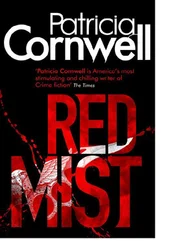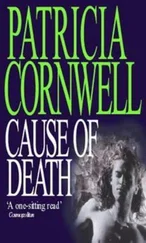Jerome Wild’s tattoo was large and elaborate, and began just above his left collarbone and ended behind his left ear, and maybe he didn’t think it was a problem. He was the getaway driver and never stepped inside the banks, and likely assumed he would never be captured on camera. He assumed wrong. In one of the robberies, a security camera at the corner of another bank across the street captured him clearly behind the wheel of a stolen white Ford Taurus, a hand out the window adjusting the side mirror. He was wearing black gloves lined with rabbit fur.
That photo, which was his downfall, was on a video screen inside the SAC conference room, and it was a face Benton had seen before, just last night, in security stills from Benton and Scarpetta’s own building. Jerome Wild in dark glasses and a cap and black-leather rabbit fur-lined gloves. Skeletons climbing out of a coffin covering the left side of his neck. The still from a bank robbery and the still from last night, next to each other in windows on a big flat screen. They were the same man, a pilot fish, a small predator, a recruit who was too unsophisticated and reckless to believe he’d ever get caught or to give it a thought. Wild didn’t know or care about tattoo databases, and Jean-Baptiste didn’t either, it seemed.
Wild was only twenty-three, was bright and craved excitement and loved taking risks, but he had no values or beliefs. He had no conscience. He certainly wasn’t patriotic and didn’t give a damn about his country or those who fought for it. When he’d enlisted in the Marines, it was for money, and when he was sent to Camp Pendleton he hadn’t served in the Corps long enough to suffer the loss of fallen comrades yet. He hadn’t boarded the C-17 yet that was to take him to Kuwait, hadn’t done a damn thing except have a good time in California, all expenses paid. The only inspiration required for what was a deeply symbolic and serious tattoo had been the idea of getting a tattoo, any tattoo, as long as it was “cool,” according to another soldier who had been interviewed several times now by the FBI.
Wild got his cool tattoo and soon after returned to his birthplace of Detroit for a weekend furlough before he was to be deployed. He never went back to the Marine Corps base. The last reported sighting was by someone who’d gone to high school with him and was fairly certain he recognized Wild in the Grand Palais hotel casino playing the slot machines, and hotel security recordings had confirmed it was him. Playing slots, at the roulette table, at one point walking the floor with a well-dressed elderly man the FBI had identified as Freddie Maestro, believed to have ties to organized crime and the owner of, among other establishments, High Roller Lanes here in New York. Two weeks later in early June, a bank branch near Detroit’s Tower Center Mall was robbed by a frumpy white woman in a linen suit who was driven away by a black man in a stolen Chevy Malibu.
Benton was stunned, and he felt foolish. He needed to reexamine his life, and now wasn’t a good time to do it, not during a discussion like this with people like this inside an SAC conference room. For all practical purposes, he had gone from being an enforcement agent of the law, an officer of the court, to becoming a fucking academic. A bank robber had been his goddamn patient, and he’d had no idea because he wasn’t allowed to do a background check on Dodie Hodge, wasn’t allowed to look into anything about who or what she was beyond a loathsome woman with a severe personality disorder who claimed to be the aunt of Hap Judd.
Benton could tell himself all he wanted that even if he’d done a thorough background check on her, what was there to know? Logically, the answer was nothing. He felt angry and humiliated, wishing he was FBI again, wishing he was carrying a gun and a badge and had the imprimatur to find out whatever the hell he wanted. But you wouldn’t have found anything, he kept telling himself as he sat at the conference table inside a room that was, of course, blue, from the carpet to the walls to the upholstery of the chairs. Nobody found out anything until you saw her pictures on the wall, he said to himself. She wasn’t recognized. She wasn’t searchable by computers.
Dodie had no identifying feature, such as a tattoo, that might end up in a database. She’d never been charged with anything more serious than being disorderly on a bus in the Bronx, and shoplifting and disturbing the peace in Detroit last month, and on neither occasion was there any reason under the sun for anyone to link this fifty-six-year-old bombastic and unpleasant woman to a series of cleverly executed heists that not so coincidentally completely stopped while she was a patient at McLean. Benton reminded himself repeatedly he could have checked her all he wanted and never linked her to Jerome Wild or the Chandonnes. The link was dumb luck. Jean-Baptiste’s bad dumb luck, because nothing was ever enough for him. He’d carelessly left his DNA in a stolen Mercedes, had done a number of things of late that went too far. He was decompensating, and now he was before them, before Benton again. Not just a link or a branch but the root.
His mug shot was on a flat screen across the table from Benton, the last known photograph, taken by the Texas Department of Justice almost ten years ago. What did the bastard look like now? Benton couldn’t stop staring at the image on the wall-mounted screen. It seemed the two of them were looking at each other, squared off, confrontational. The shaved head, the asymmetrical face, one eye lower than the other and the flesh around them an inflamed, angry red from a chemical burn that Jean-Baptiste claimed had made him blind. It hadn’t. Two guards on the Polun sky Unit had found that out the hard way when Jean-Baptiste slammed them against a concrete wall and crushed their throats. In the spring of 2003, Jean-Baptiste walked out of his death-row cell wearing a uniform and a name tag, a murdered guard’s car keys conveniently in a pocket.
“Not an offshoot but a segue,” Lanier was saying to Berger, and the two tended to argue a lot and Benton really hadn’t been listening.
Another e-mail from Marino just landed:
On my way to the DNA bldg to meet lucy and the doc
“It will be more obvious when we get a visual. I agree with Benton. But Jerome’s nonviolent,” Lanier was saying. “He’s always been nonviolent. So nonviolent he went AWOL. Went into the military because he couldn’t get a job, and then bailed out because he happened upon an illegal opportunity.”
Benton e mailed Marino:
Why?
Lanier kept talking. “The Chandonnes’ tentacles are in Detroit. Just as they’re in Louisiana, Las Vegas, Miami, Paris, Monte Carlo. Port cities. Casino cities. Maybe even Hollywood. Anything that attracts organized crime.”
Benton reminded everyone at the table, “But not the father anymore. And not Jean-Baptiste’s brother. We carved up the rotten apple in 2003. We didn’t get the core, but he’s not the same breed.”
Marino’s e mailed reply:
Toni dariens watch
Benton continued, “You’re talking about a lust murderer, someone much too compulsive, much too impulse driven, to successfully run a cartel, to run anything as complex as his family business has been for the better part of a century. We can’t work this like an organized-crime case. We have to work it like a repetitive sexual murder case.”
“It was a viable bomb,” Berger said to Lanier, as if Benton hadn’t said anything. “It could have severely injured or even killed Kay. How can you possibly construe that as falling within the rubric of nonviolent?”
“You’re missing my point,” Lanier told her. “Depends on his intent, and if, in fact, Wild is just the messenger, then he may not have even known what was in the FedEx box.”
Читать дальше












